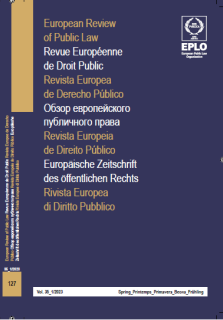
Climate Governance: New Challenges
to the so-called “Environmental Democracy”
Professor, Instituto de Derecho Europeo e Integración Regional, Facultad de Derecho,
Universidad Complutense de Madrid
This article analyzes some trends of climate change governance that impact the development of the so-called “environmental democracy”, such as the increasing role through new channels of both science and public participation. First, it gives a brief account of the debate on climate change and democracy, and it links it with the concept of “environmental democracy”. Next, it focuses on how the increasing role of both science and public participation is generating new synergies in the realm of climate governance that widen the scope of the three pillars of environmental democracy as enshrined in Principle 10 of the Rio Declaration and the Aarhus Convention: access to environmental information, public participation, and access to justice on environmental matters. In this context, it highlights the expanding role of scientific bodies and the proliferation of new forums of public deliberative participation in the realm of climate governance. It also points out the links between these trends and the rising tide of climate change litigation.
Cet article analyse certaines tendances de la gouvernance de changement climatique qui ont un impact sur le développement de ce que l’on appelle “démocratie environnementale”, tel que le rôle croissant à travers de nouveaux canaux de la science et de la participation du public. Premièrement, il donne un bref aperçu du débat sur le changement climatique et la démocratie, et il l’associe au concept de “démocratie environnementale”. Ensuite, il se concentre sur la manière dont le rôle croissant de la science et de la participation du public génère de nouvelles synérgies dans le domaine de la gouvernance climatique qui élargissent le champ des trois piliers de la démocratie environnementale tels qu’ils sont inscrits dans le Principe 10 de la Déclaration de Rio et la Convention d’Aarhus: accès à l’information environnementale, participation du public, et accès à la justice dans le domaine de l’environnement. Dans ce cadre, il souligne le rôle accru des organes scientifiques et la prolifération de nouveaux forums de participation déliberative du public dans le domaine de la gouvernance climatique. Il souligne également les liens entre ces tendances et la marée montante du contentieux sur le changement climatique.
* This article is based on the paper presented at the annual meeting of the European Group of Public Law in September 2022. It is part of a broader research project on the impact of climate change on Public Law institutions, and some of the ideas put forward here build on selected issues examined in C. Plaza, Climate Change: Turning the World (and Public Law) Upside-down, in: K. Gromek-Brok, Public Law in a Troubled Era. A Tribute to Professor Patrick Birkinshaw, Wolters Kluwer, Chapter 5, forthcoming.





















